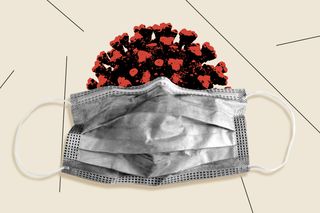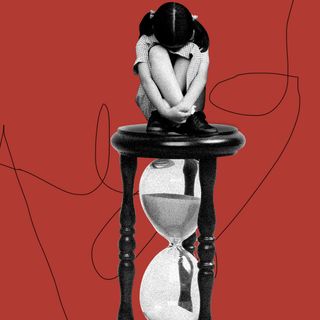
Covid19 Reinfection: Myth or Not? Well, It’s Complicated.
A loose consensus among doctors is that it’s too soon in the pandemic to know for sure.

All around the world, anecdotal evidence and small-scale, inconclusive studies abound about the possibility of Covid19 reinfection, fueling a growing discontent among people who have already been in lockdown for almost half a year. They are now seeing (often sensationalized) news that they might not ever be safe from the novel coronavirus, that people are getting reinfected all around the world, and that no matter what they do, the disease could always get them.
Amidst all this chaos, The Swaddle conferred with pulmonologists in Mumbai to understand exactly what is happening with Covid19 reinfection — what little do we know, and what we don’t.
Most of the information we have now is based on other viruses, Dr. Lancelot Pinto, pulmonologist at Hinduja Hospital, says. “We are just drawing parallels… What we know is that in the other coronaviruses, it’s not common to have reinfection. That’s why experts around the world are saying it’s their gut feeling that it’s not going to happen [with Covid19].”
But what about the proof? That’s the tricky part, Dr. Pinto says. He gives the example of the first possible reinfection he came across in May — a patient who had tested positive for Covid19 and was isolated and treated. A Covid19 test 17 days after her first test was negative. For six weeks, the patient remained asymptomatic, after which she again showed symptoms, tested positive, was treated and sent for home quarantine. Was this patient reinfected, or was it just the virus from the first infection rearing its head again?
The only way to know for sure is to study the genetic components of the virus from both the tests to see if one version is slightly different, Dr. Pinto says. “If the sequences match, then it’s a relapse. If they don’t, it’s a reinfection.” Dr. Pinto is currently awaiting the results of this comparison from a sophisticated laboratory that is equipped to do this type of genome sequencing. At this time, no known case of suspected Covid19 reinfection has been confirmed, and one small-scale study that tried to establish reinfection also provided inconclusive evidence.
Knowing the difference between a relapse and reinfection, and how often either happens, is essential to how comfortably people can move in public spaces and what measures they need to take to protect themselves. It will also help tighten treatment procedures for patients, ultimately taking us one step closer to figuring out the novel coronavirus. For now, experts suggest there’s no cause for concern. From a citizen’s point of view, it is important to understand the process of testing, and the current faults within, in order to curb alarmism about reinfection.
One obstacle that makes the assessment of infection/reinfection tricky is the validity of the test itself. The RT-PCR test, the current standardized test used along with a swab, detects the infection in 70% of patients, which makes it prone to false negatives 30% of the time. Further, the test doesn’t differentiate between live and dead virus; that is, virus that can replicate and infect versus virus that is essentially genetically dead. For example, a study from South Korea in early April assessed reinfection reports and concluded the virus detected in recovered patients was just dead virus that resulted in false positives.
Another factor to take into consideration is that this pandemic has only gone on for less than half of a year at this point. According to Dr. Jeenam Shah, a pulmonologist at Wockhardt hospital, this is not enough time for doctors to conclusively prove that a patient has tested positive, recovered completely, and then become reinfected again.
Related on The Swaddle:
A big part of understanding this puzzle is decoding the various immune responses the human body has to the coronavirus, experts say. Whenever a person gets infected, their first line of defense is their own cells, Dr. Pinto explains. Humans produce antibodies to fend off an attack on the immune system. Research shows that the number of these initial antibodies declines in the body within one to three months of recovery, depending upon the severity of the infection. But we don’t know if this antibody decline makes us more vulnerable to reinfection.
Additionally, we’re nowhere close to assessing the main, stronger, and more long-lasting immunity-giving mechanism called acquired cell-mediated immunity offered by the body’s T-cells. Currently, the famed Oxford trial is one of the few in the world that is testing both the antibody and T-cell immunity in recovered Covid19 patients. We don’t know conclusively yet if T-cells can help ward off reinfection, or if we need a combination of T-cells and certain types of antibodies, or how much of them we need. Without this information, we would not be able to assess if Covid19-recovered patients are prone to reinfection or not, because we don’t yet fully understand what makes them immune or the lack of which antibodies makes them susceptible.
The way the immune system works varies widely, Dr. Pinto adds. “What we really need to know, I don’t think we can know without the element of time passing. It’s just a lot of conjecture.”
So, where we currently stand is a precarious situation — experts around the world are cautiously stressing that reinfection isn’t all that common, but it’s still dangerous to tout this hypothesis as fact. On the one hand, confidently stating that reinfection can occur is alarmist and inaccurate; but saying that reinfection cannot occur will give people a false sense of security that can potentially be dangerous.
This is why experts are shying away from making absolute statements, even as they themselves struggle to treat patients, armed with limited science. “It’s frustrating, to be honest. Being on the medical aspect, I’m used to knowing what is working and what is not working,” Dr. Shah says, adding it’s important the public and media exercise constant vigilance and don’t succumb to pharma-driven propaganda regarding Covid19.
Dr. Pinto sums it up as “never believe anything based on any one study” and “take everything with a grain of salt.” For now, cautious optimism and a push for more conclusive studies will have to suffice.
Rajvi Desai is The Swaddle's Culture Editor. After graduating from NYU as a Journalism and Politics major, she covered breaking news and politics in New York City, and dabbled in design and entertainment journalism. Back in the homeland, she's interested in tackling beauty, sports, politics and human rights in her gender-focused writing, while also co-managing The Swaddle Team's podcast, Respectfully Disagree.
Related


Do People Really Eat Whatever They Want And Stay Thin?
